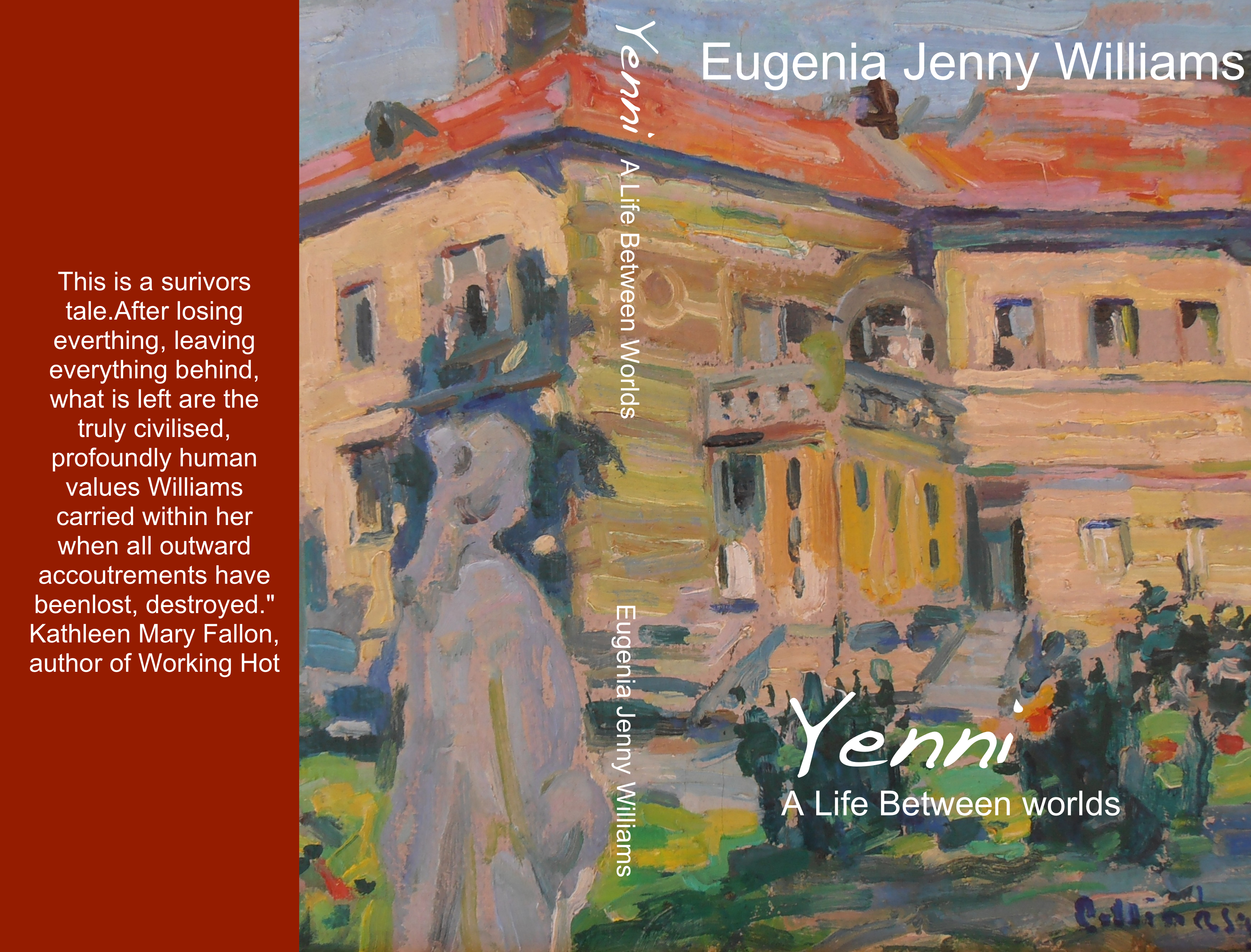Yenni A Life Between Worlds
Submision Type
book
Logline
As a child Yenni lives under the discipline of preparations for the war. In January 1945 her city is liberated by the Red Army and the Iron curtain closes in. Her account enables the reader to experience the life in middle Europe before the WW2, during and after.
Genre
Memoir,Biographical
Short Summary
Sundays are special. They are family days with clear chicken soup, home-made noodles, crumbed chicken, mashed potatoes and a cabbage stew. Just back from the swimming pool Yenni catches the hum of aeroplanes. Everyone looks up to the sky. In the distance a big cloud is lifting, The city is bombed.
Setting
the city of Kassa (Hungarian) later named Kosice in now Slovak Republic, Vienna
Based on a True Story
Yes
Plot - Premise
Voyage and Return,Other
Plot - Other Elements
Happy Ending,Meaningful Message
Mature Audience Themes
Information not completed
Main Character Details
Name: Yenni (Hungarian translation of Jenny)
Age: from 5 to 34
Gender: Female
Role: Emotional
Key Traits: Adventurous,Aspiring,Confident,Decisive,Educated,Leader,Outspoken,Skillful,Romantic,Sophisticated
Additional Character Details
Name: Yano (Slovak for John)
Age: 26 to 40
Gender: Male
Role: Antagonist
Key Traits: Aggressive,Charming,Complex,Educated
Additional Character Details
Name: Marta Pokorny- mother
Age: 36 and more
Gender: Female
Role: emotional
Key Traits: Aspiring,Charming,Educated,Sophisticated
Additional Character Details
Name: Marta Pokorny- mother
Age: up to 59
Gender: Female
Role: emotional
Key Traits: Aspiring,Charming,Decisive,Educated,Leader,Sophisticated,Skillful,Outspoken
Genre
WAR, DRAMA
Brief
Yenni and her family try to survive Hungary in the wake of the German occupation during WW2. After surviving the war their country is freed by the Red Army. Different restrictions come with being within a communist regime. Yet Yenni continues to learn the different networks working around the governments in order to get her evolving family what they need. In the end everyone escapes to Austria too start a new life in Australia.
Overall Rating
FAIR
Narrative Elements
Authors Writing Style: FAIR
Characterization: FAIR
Commerciality: FAIR
Franchise Potential: FAIR
Pace: FAIR
Premise: GOOD
Structure: GOOD
Theme: FAIR
Accuracy of Book Profile
The short summary in the profile is a snapshot of two diary like entries within the story that are the sandwich ends rather than an overview of the plot. By placing a shorter overview of Yenni's four different phases of life before the war, during the war, after the war and prepping to become an immigrant, the summary would better represent the whole of the narrative.
Draw of Story
The unusual perspective of Hungary and its broad overview of before the war, during and after as a communist country is unique. Most English based stories focus on more well known Allies countries in WW2 or the Jewish experience while Yenni's journey are a Hungarian woman is less common.
Possible Drawbacks
The external threat of war is more of a vague conflict while Yenni is a child so the description of the world building lacks a visceral tension. While it is realistic that she has childish concerns before and during the war, it is unclear how the experiences of the war are changing her whether she is conscious of its effects or not.
Use of Special Effects
THE STORY RELIES A LITTLE BIT ON SPECIAL EFFECTS
Primary Hook of Story
The hook is that Yenni grows up around WW2 and is then placed behind the Iron Wall. During the Cold War, Yenni's home in Hungary was right on the border so capitalist freedom and luxury was so close and yet so far.
Fanbase Potential
While the market for WW2 dramas is a bit saturated, depending on the focus of the piece this could have a medium to decent audience for a period piece given the freshness of Hungary and the mystery appeal of the Cold War.
Awards Potential
The characters react to a variety of situations with some range in emotion, but the themes and internal conflicts are not as apparent in order to stand out for nominations.
Envisioned Budget
MEDIUM BUDGET
Similar Films/TV Series
LENINGRAD, THE SHAPE OF WATER, ONCE, AN AMERICAN RHAPSODY
What’s New About the Story
There is a quietness with Yenn's satisfaction in doing what needs to be done to help her family survive. She lives a normal life given her circumstances of surviving WW2 and the Cold War and she is content with being normal. It is refreshing to have a war movie without much war or espionage.
Lead Characters
Yenni is honest and unselfish. She knows how to make herself content but change things within her means when change is needed to better her life. She is a survivalist without being an exceptionalist.
Uniqueness of Story
The setting and premise have a lot of potential, but the reactionary nature of much of the protagonist's life makes the internal conflict transformation unclear. The tone and genre is refreshing for a WW2 and Cold War film.
Possible Formats
Film - Indie, Film - Streaming, Film - Studio, TV Series - Limited Run / Mini-Series
Analyst Recommendation
WORK IN PROGRESS
Justification
While the story has many positive points, it has room for improvement (see possible paths below). If you can't change the story at this point, my suggestion is using your notes as a guide to highlight the best aspects of it when taking the next steps, either putting a pitch page together, a treatment, or a presentation.
Tips for Improvement
Creating a clearer internal journeys outside of survival would create more emotional investment in the characters. THe world building is great, but discerning a theme between the different time period might better integrate into one cohesive narrative story separate from just following the protagonist as they age.

